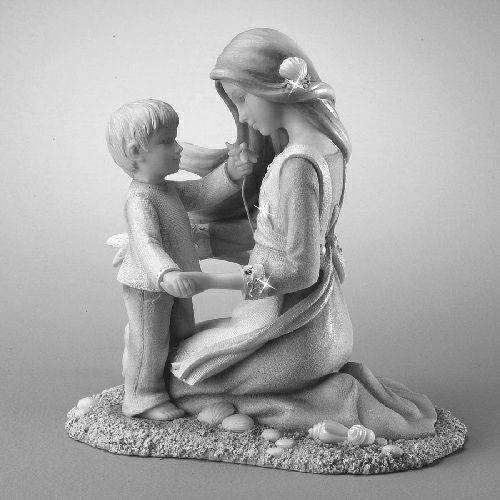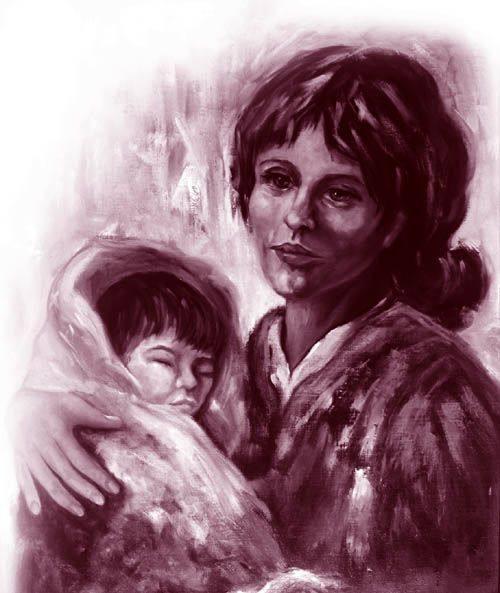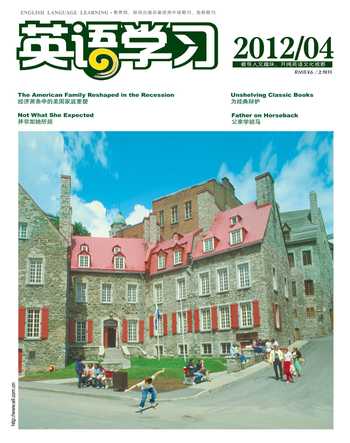完美母亲
Paula McLain
The Mother I Never Had

I have had six or eight mothers, depending on how finely you mince the definition, and though the woman who gave birth to me is simply one figure in that difficult mix, she set everything else into motion and therefore looms largest.1 I was four when she vanished. No note, no tearful good-bye, just poof, she was gone. She was 25—a young 25—and though I now assume her life was sad, frightening, and essentially hopeless, at the time my two sisters and I couldnt begin to fathom2 her motives. We were simply left staring into the black hole of her absence.
For the next decade and a half, we bounced around like pinballs3. My father was unreliable—in and out of trouble, in and out of jail—and so others stepped in. We stayed first with our grandmother, then with a single aunt, and when no one in our family could commit to our long-term care, the three of us were shunted into Californias foster-care system4. Because we rarely, if ever, knew why we were leaving any situation or where we would land, dislocation and bewilderment became the standard.5 Helplessly, we entered strangers homes holding garbage bags full of our clothes.
My sisters (one older, one younger) and I never really talked about what was happening. For my part, I fixed all my energy on the perfect family that I assumed was out there somewhere, waiting to embrace us.
Years later, when no such family had materialized and my disappointment threatened to overtake me, I spun my strategy 180 degrees.6 I decided the only way to survive was to give up my fantasy for good. I stopped watching the horizon; no one was coming to save me. When I aged out of the foster-care system, I swore that I would fashion myself a solid, reliably good life. I would become the mother I had been endlessly denied, loving and lovable, poised to kiss and bandage, bolster and encourage.7
Easier said than done. At many points during the 17 years Ive brandished apron strings, Ive been flat-out schooled by my past.8 Parenting without having had positive role models is harder than I imagined. Of course, I had other types of models, so to speak: One foster mother was cold and controlling and never touched me if she could help it. Another was overwhelmed and mostly absent. A third really wanted a baby, cooing and gurgling and precious, not a shell-shocked schoolgirl.9 When I look back at my childhood, I think of it as war duty, the time I did in the trenches10. Not all of me made it out alive.
My most treacherous period as a parent was the first year or two, the rookie stage, when I didnt know just how much torque my history could wield.11 I was 27 when my son Connor was born. Old enough, I thought. Older than my mother was when she hightailed it12 away from me. And, besides, I wasnt her. Safe and sound in my first marriage (or so I believed), I had a well-feathered nest. All the baby books were indexed and crossreferenced.13 I thought I was ready.
The practical business of parenting wasnt the problem. Connor was a good infant. He slept well, breast-fed like a champ, splashed adorably in his bath.14 One afternoon I snapped a photo of him in his bassinet, napping in an onesie with red and blue stars on the tush, knees tucked toward his belly, thumb nuzzling his perfect nose.15 That picture breaks my heart. Present tense. It breaks my heart now. At the time, I didnt feel much of anything when I looked at my son. Or my husband, or the television, or the fireflies crisscrossing my yard on a summer night.16 I had expected to feel awash with maternal love and contentment.17 Instead I felt empty and sad.
“Youve got a case of the baby blues,” my obstetrician said when I fell apart during a checkup.18 She told me to get more rest and to phone her office if I thought I needed medication. Maybe I should have called her; Im still not sure. Postpartum depression was most likely part of what was going on with me—but there was another piece of the puzzle that had little to do with hormones.19
When I looked at my son, who was totally dependent on me to meet his every need, I was abruptly brought face-to-face with my mothers leaving. The thought that kept running through my mind wasnt intellectual but visceral and raw:20 I had been her baby. She had held and fed and dressed me—and she had left me anyway.
I had never come to terms with21 these feelings. I didnt cry for my mother when I was a girl, and I dont remember missing her. Neither of my sisters ever mentioned her name. It was as if we had separately and collectively erased her. Even when I was in full fantasy mode, imagining the family that would rescue me, my mother never appeared as even a minor character—and I certainly never pictured her coming back for me. Maybe I had already fully recognized that she would never pull herself together enough to return. Or maybe I wanted her to return so fiercely and completely that I couldnt bear to wish for it.
At 27, I didnt understand to what extent I was still a terrified little girl clutching a garbage bag—I only knew I couldnt cope. I wanted to be a perfect mother and to give my son a flawless childhood, but that pressure became immobilizing22. If I lost my patience, for instance, or couldnt soothe23 him instantly, I felt like a failure. My moods swung wildly on any given day. Although my husband was understanding at first, he eventually became concerned, then impatient, then furious. He hadnt signed up for a morose24 and barely functioning wife. He wanted me to get back to my normal self. The problem: I had no idea who that was.
First I moved to the couch, then to a friends house, and then left for good, taking Connor—by then a toddler—to a town a few hours away, where I attended graduate school.25 We lived on student loans in bare-bones cinder-block family housing.26 My days were a blur of macaroni-and-cheese and Hot Wheels,27 of pausing in the middle of a term paper.
The move and new challenges helped bump28 me out of my depression for a short while, but my improved state of mind didnt last. Connor and I looked nothing like the dream family that had carried such tremendous weight in my childhood. That image was even more powerful now that I feared my choices were leading me further and further away from it. How could I give Connor a happy childhood if my own happiness was never within my grasp?
I began to spend whole afternoons in the bathroom crying. During commercial or Lego29 breaks, Connor would come to the door and knock lightly. “What are you worried about, Mom?” I sobbed harder. I had no words for how I felt. But I feared that I was making a hopeless snarl30 of our lives. That no matter what I did, Connor and I were going to end up back where I had started, in a landscape filled with chaos and desperation.
When I look back, I can see that I wasnt depriving Connor of anything vital; he was loved and cared for. But at the time my expectations threatened to topple me over like an oncoming avalanche.31 I wouldnt feel safe from the gnawing32 worry that I would one day become my mother and repeat all her mistakes.

A few months later, Connor and I were in a drive-through line waiting to order hot-fudge sundaes, the car warm and idling as a light snow fell.33 I looked across the parking lot at a drugstore and thought about buying a big bottle of aspirin and killing myself. The urge came bloodlessly, without any emotion at all, and that scared me the most. I didnt want to die. And I couldnt leave Connor without a mother.
I asked for help, a real departure for me. I phoned friends until I got the name of a good therapist, and it was then that I began to unpeel the painful layers and grieve for my girlhood for the first time.34 Becoming a mother had reopened scarcely healed wounds and plunged me back into the trauma35 of my early years. No wonder I felt so broken—I was.
Unfortunately, even the best therapy doesnt fix you up good as new36. From my late 20s to my late 30s, I watched as my friends morphed into parents, buying minivans and bottle systems and diaper bags that seemed to do everything but fly.37 By the time Connor was about 10 (and seemed pretty well-adjusted, too, amazingly), I felt a longing to give parenting another go.
It wasnt a simple matter. The part of me that wanted marriage and more children was in conflict with the part that was out-andout38 terrified. What if things got as bad as they were the first time, or even worse? I thought. And then I forged ahead anyway.
I was 38 when I remarried, and within months I was carefully charting my basal temperature.39 When I mentioned wanting to get pregnant to my gynecologist, he raised an eyebrow and proceeded to deliver dire statistics about the odds of conceiving at my age.40 Ultimately, I got lucky—so lucky.
In 2004 my daughter, Fiona, was born in the middle of a lightning storm. Outside, branches seesawed41 and telephone wires swung wildly, but our birthing room was dim and quiet. When she drew her first breath, it was quiet, too. She looked at me with eyes that belonged to a baby owl. She seemed to know everything about me already and to be saying, with her gorgeously arched feet and the small shells of her ears, that she would take me as I am.
The next day, as my new husband snored on a cot in the corner of our hospital room and my baby owl slept in my arms, I watched a TV special about Aron Ralstons ordeal at Blue John Canyon.42 I was transfixed by his story and felt a strange kinship with it.43 Ok, I had never been pinned for days under a boulder or amputated my own arm or rappelled down a canyon wall.44 Still, I related to his will to survive. My mother had given up on me; at times I had considered doing the same. But I was still here, thrumming45 with a desire to live—and so was my family.
Two years later, after more charting and even more ominous46 statistics from my gynecologist, Beckett was born. Connor was 13 at the time, and as I handed him Beckett, squirming a little under his blue-striped hospital hat, I said, “You have a brother. What do you think about that?”
“Weird,” he said. But he was smiling.
It is weird to be potty47 training one son and lending the other my car, but its wonderful, too. Somehow Ive managed to create the family Ive always wanted. Ive had to work hard, building from scrap metal48 and making it up as I go along much of the time, but my children are three of the most remarkable people I know. The old anxieties threaten me at regular intervals, but facing them down helps diminish their potency—and strengthen mine.
When I ask Connor what he remembers from those years when we were on our own, he recalls only good things—this treasured toy, that favorite book, a trip to the petting zoo with friends. You know, typical magical childhood stuff.?
1. mince: 细分;mix: 混合体,此处指所有充当作者母亲角色的人;set sth. into motion: 也作put sth. into motion,使某物开始运转或工作;loom large:显得重要(令人担忧,很难回避)。
2. fathom: 理解,领悟(复杂或神秘的事情)。
3. pinball: 弹球游戏(一种在机器上玩的游戏,通过控制杆击球到规定区域而得分)。
4. foster-care system: 指将家庭遭受变故、失依、失养或遭虐待等事情的儿童及少年安置于符合的家庭寄养的一种做法。
5.居无定所和惶恐无助已是家常便饭。dislocation: 搬家;bewilderment:困惑。
6.materialize:发生,成为现实;overtake: 控制,压倒;spin: 使旋转。
7. poised: 准备就绪的,已做好准备的;bolster: 增强,激励。
8. brandish: 挥舞;flat-out: 完全的;school:v. 教育,培训。
9.另外一个寄养家庭的女主人是真的想要个小孩儿,但是她想要的是一个还在咿呀学语,娇嫩无比的婴儿,而不是一个倍感惶恐的学校女生。coo:(鸽子等)发咕咕声;gurgle:(婴儿喉中)发出咯咯声;shell-shocked:慌乱的,焦虑的。
10. in the trenches: 在战壕里,形容处于危难时刻。
11. treacherous: 有潜在危险的;rookie:新手,生手;torque:转矩,扭转力;wield: 施加(影响)。
12. hightail it: 赶紧跑,快跑,仓皇奔逃。
13.in d ex:给书加索引;cross -reference: 通过互见指引。
14. breast-fed: (婴儿)母乳喂养的;adorably: 惹人喜爱地。
15. bassinet :(婴儿的)摇篮;onesie:婴儿连身衣的一种,婴儿的双腿露在外面;tush:〈美俚〉屁股;tuck:把(两腿)蜷曲;nuzzle: 轻触,轻擦。
16. firefly:萤火虫;crisscross:在……上交叉往来。
17. awash:充满的,充斥的;
maternal:母亲的,母性的。18. baby blue: 〈非正式〉产后抑郁症;obstetrician: 产科医生;fall apart: 崩溃;checkup: 体检。
19. postpartum depression: 产后抑郁症;hormone: 荷尔蒙,激素。
20. visceral: 出于本能的,发自内心的;raw: 原始的。
21. come to terms with: 与……达成妥协,让步于……。
22. immobilize: 使停止,使不动。
23. soothe: 抚慰,安慰,使平息。
24. morose: 闷闷不乐的。
25. for good: 永久地;toddler: 蹒跚学步的孩童;graduate school: 研究生院。
26. bare-bone: 必要的,少得不能再少的;cinder-block: 空心砖。
27. blur: 一片模糊;macaroni: 通心粉;Hot Wheels: 一种小孩子的玩具汽车。
28. bump: 颠簸前行。
29. Lego: 乐高积木。
30. snarl: 混乱,一团糟。
31. topple: 使倒下;avalanche: 雪崩。
32. gnawing: 折磨人的,令人痛苦的。
33. fudge:(通常用糖、黄油、牛奶或奶油和巧克力制成的)乳脂软糖,奶油软糖;sundae: 圣代冰淇淋;idle: (机器)空转。
34. therapist: 治疗专家;unpeel: 剥开。
35. trauma: 心灵创伤,痛苦的经历。
36. (as) good as new: (状态)像崭新的一样好。
37. morph:使变成……;bot tle systems: 指“奶瓶”;diaper: 尿布。
38. out-and-out: 十足的,彻头彻尾的。
39. c h a r t :记录(某事物)的变动;basal temperature: 基础体温。
40. gynecologist: 妇科医生;odds: 机会,可能性;conceive: 怀孕。
41. seesaw: 上下(或前后)摇动。
42. snore:打鼾,打呼噜;cot:轻便床(尤指折叠帆布床);Aron Ralston: 阿伦·罗斯顿,美国登山爱好者,2003年在Blue John Canyon攀岩探险时遇到意外,右臂被夹在石缝中无法动弹,支撑5天后自己割臂自救,最终生还。
43. transfix:(由于惊恐等而)呆住,惊呆;kinship: 类似,近似。
44. boulder: 巨石;amputate: (手术中)切除;rappel: 绕绳下降。
45. thrum: 连续轻叩。
46. ominous: 不祥的,不吉利的。
47.potty:(小孩子用的)便盆,小夜壶。
48. scrap metal: 废金属。

